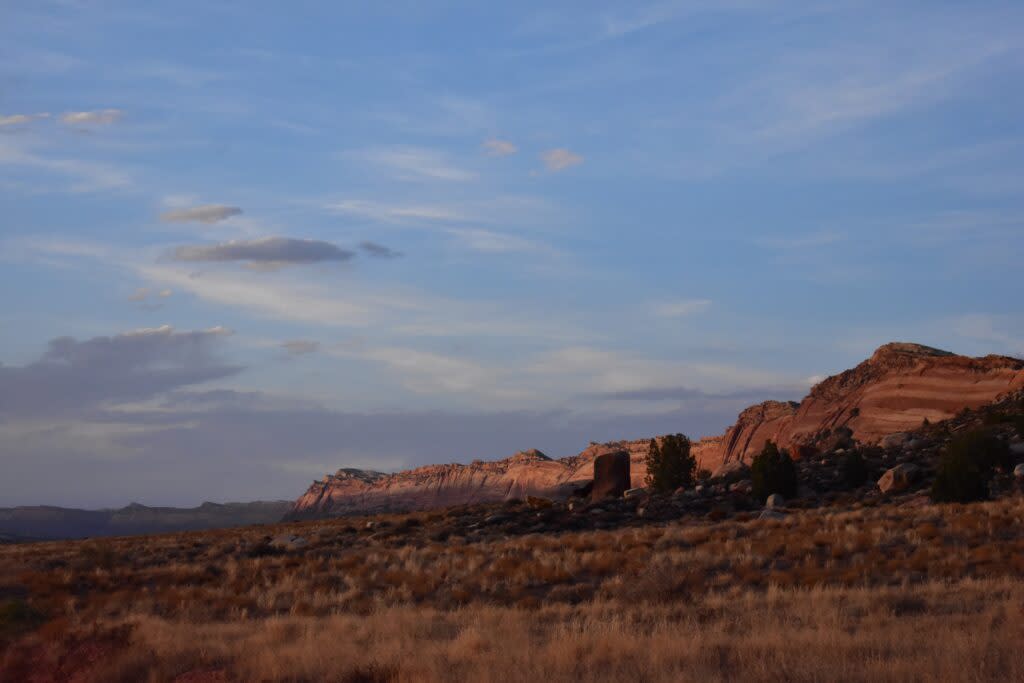Utah sues the federal government again, this time over land conservation policy

- Oops!Something went wrong.Please try again later.
Comb Ridge in Bears Ears National Monument is pictured on May 10, 2018. (Kyle Dunphey/Utah News Dispatch)
Utah is suing the federal government, again, this time over a new public lands policy that allows land managed by the Bureau of Land Management to be leased for conservation.
That policy, called the Public Lands Rule, was finalized without the proper environmental review from the Bureau of Land Management, or BLM, and the U.S. Department of Interior, the state contends in its lawsuit, filed Tuesday in U.S. District Court in Utah. The state of Wyoming is also a plaintiff in the suit.
“The National Environmental Policy Act (NEPA) requires agencies contemplating a major action to carefully consider possible environmental consequences before moving forward,” the complaint reads. “This case arises from the Bureau of Land Management’s failure to uphold that NEPA obligation.”
GET THE MORNING HEADLINES DELIVERED TO YOUR INBOX
In a 34-page complaint, attorneys for both states ask the court to repeal the rule and place an injunction while the process plays out in the court, basicallying nullifying it for the time being.
The rule was finalized in April and took effect on June 10. Similar to how the BLM currently leases its land for mineral extraction, energy development, recreation or grazing, the new rule creates conservation leases.
Now, groups can purchase a restoration lease, intended to improve habitats and restore or conserve land — and a mitigation lease, aimed at offsetting existing development and projects on BLM land.
In typical fashion, the policy was met with praise from environmental groups and disdain from Utah politicians, who raised concerns that the rule could lock up land, hindering traditional uses like grazing or commercial guiding.
Utah Attorney General Sean Reyes said it was “devastating” for the state.
“It allows the BLM to unnecessarily restrict access to millions of acres of land by adopting a hands-off, museum-like management approach,” Reyes said in a statement. “The Rule redefines and prioritizes ‘conservation’ or ‘non-use’ over all other legal and productive uses, directly violating existing federal law and vitiating the intent of multi-use policies as required by the Federal Land Policy and Management Act.”
Meanwhile, the Southern Utah Wilderness Alliance’s legal director Steve Bloch reiterated support for the rule on Tuesday, writing in an email that the lawsuit “highlights how unserious (Utah’s) elected leaders are about addressing the challenges facing public lands.”
“This lawsuit is out of touch with the majority of Utahns who support conservation and know climate change is a serious problem,” Bloch said, calling the suit “disappointing, but predictable.”
Bloch said he looks forward to seeing the rule’s “positive impact” on Utah’s public land, which make up about 70% of the state.
“The Rule will keep conservation top of mind as BLM goes about its daily work to manage some of the most intact and ecologically significant public lands in the country,” Bloch said.
For months, Utah Gov. Spencer Cox had hinted at a legal challenge. That took shape this week, with attorneys arguing the BLM took an “unreasonable” interpretation of federal guidelines in applying a categorical exclusion, which allowed the agency to forgo an environmental impact statement typically required under NEPA.
“By invoking that unreasonable interpretation as its reason for failing to conduct proper NEPA review, BLM has acted arbitrarily and capriciously,” the complaint reads.
The complaint also accuses the BLM of ignoring concerns from various groups during the public comment period, including the state of Utah, Wyoming politicians, mining and solar companies and more.
In Utah, the rule could financially burden the state’s Division of Wildlife Resources and Department of Agriculture and Food, attorneys for the state claim. That’s because the risk of “other individuals or entities” leasing land for conservation is so great that the state plans to purchase all available parcells.
“These agencies intend to apply for every restoration and mitigation lease that becomes available,” the complaint reads. That could cost taxpayers upwards of $5 million, according to court documents.
Earlier this year, outgoing Republican Rep. and current Senate candidate John Curtis introduced legislation to repeal the rule. Dubbed the Western Economy Security Today Act, it passed the House after a bipartisan vote in April.
The post Utah sues the federal government again, this time over land conservation policy appeared first on Utah News Dispatch.

